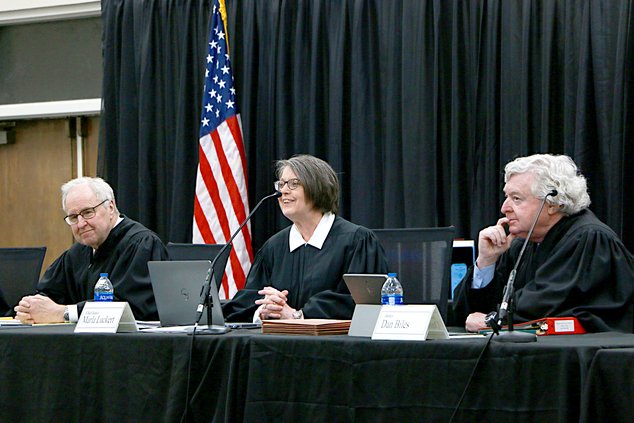After the Kansas Supreme Court heard oral arguments in two cases Wednesday evening in front of an audience at the Great Bend Events Center, Chief Justice Marla Luckert explained what will happen next.
“The court will take the matter under advisement,” she said. First, “the court will meet and talk about this case.” One or more of the seven justices may be assigned to write an opinion. The justices will review the writing and file a decision.
“It becomes an official record of the court and is published on our website (kscourts.org). They are available for you to read if you so choose,” she said.
“All of our arguments as also available on our YouTube channel,” she continued. “Any time you can watch a live argument or go back and listen to an argument from a past case that you might be interested in.”
Wednesday’s oral arguments in Great Bend were live-streamed and are also still available on that YouTube channel.
The Court’s recently released opinions can be found online at www.kscourts.org/Cases-Opionions/Opinions.
Prior to the proceedings, 20th Judicial District Chief Judge Steve Johnson addressed the audience.
“It’s not often that you’ll have this ability to actually see a Supreme Court oral argument,” he said.
That is precisely why the Supreme Court has a traveling docket with evening meetings, Luckert said. Together, they’ve informally adopted a Beach Boys song as their theme. “Round round get around, I get around ...”
Dr. Mark Tremaine, an associate professor who leads the Criminal Justice program at Sterling College, said he has taken students to many of the Supreme Court’s traveling dockets. Eight of his students attended Wednesday.
Luckert noted that the justices have already received written arguments in these cases. Its options in the criminal case will be to affirm or reverse the decision or order of the lower court, or to remand, which means to return it to the trial court with instructions, such as ordering a new trial. They would be hearing legal arguments, not evidence.
“We follow precedent and the statutes; we don’t evaluate if a law is ‘good policy,’” she said. “Our job is to take that law and apply it.”
The criminal case
In Appeal No. 123,323: State of Kansas (appellee) v. Rachael Hilyard (appellant), the appellant was represented by Randal Hodgkinson and the appellee was represented by Matt Maloney.
A Sedgwick County jury convicted Hilyard of first-degree murder in the decapitation death of her boyfriend’s grandmother. She received a Hard 50 sentence, which means she won’t come before a parole board until she is 86 years old.
Hodgkinson acknowledged the “graphic and shocking nature” of the case but said his client did not get “a fair day in court” or a fair sentence because her court-appoint attorney “asked the jury to find her guilty (of second-degree murder, a lesser charge).” Nothing in the record shows that Hilyard consented to that.
“It’s our position that a guilt-based defense may be reasonable but it has to be a client’s affirmative decision,” he said.
Hodgkinson referred to past decisions for precedent and the justices had questions about how those cases apply to this case. Justice Keynan “K.J.” Wall Jr. asked if Hodgkinson’s premise was essentially an expansion of the law, or a new law, and Luckert asked what remedy Hodgkinson proposed if the court agreed with him.
Maloney said the earlier cases did not apply here. In those cases, the defendant “repeatedly disagreed with counsel’s decision” to use a guilt-based defense.
“She never raised the issue,” Maloney said of Hilyard. “The state presented a mountain of evidence of the defendant’s guilt,” he said. In Hilyard’s own testimony, he said, “the defendant admits she did in fact kill the victim – arguing that it was not premeditated.”
The civil case
In Case No. 124,415: Mark A. Bruce (plaintiff) v. Laura Kelly, in her official capacity as governor of the State of Kansas; Will Lawrence, in his individual capacity as Chief of Staff to Governor Kelly; and Herman T. Jones, in his official and individual capacities as Superintendent of the Kansas Highway Patrol (defendant), the attorney for the plaintiff was Alan V. Johnson and the attorney for the defendant was David Cooper.
This case has gone to the U.S. District Court for the District of Kansas and that court has two questions of law certified to the Kansas Supreme Court.
Bruce was appointed superintendent of the KHP by Governor Sam Brownback. Later, when that position was terminated, he contends he was entitled to be returned to the rank he held when appointed, the rank of major.
One question is whether state law defines the rank of major in the KHP as a member of the unclassified or classified service of the Kansas Civil Service. Unclassified staff are at-will employees, while classified staff can only be fired for cause. There is a six-month probationary period when moving into the classified status. Bruce served a probationary period when he became a major, but the question now is whether or not the law requires someone in his situation to serve another six-month probationary period, where he could again be let go for any cause or with no cause.
The laws aren’t clear-cut, Justice Dan Biles said. “This is the biggest mess of statutes that I can remember.”
If the wording of the law is clear, it must be followed. If not, the court must determine the intention of the statute when it was written.







